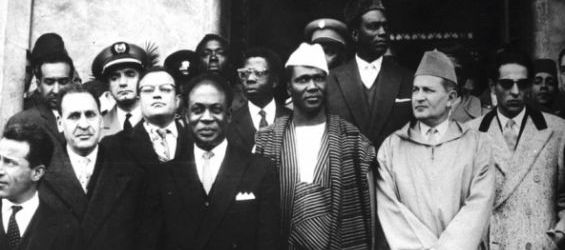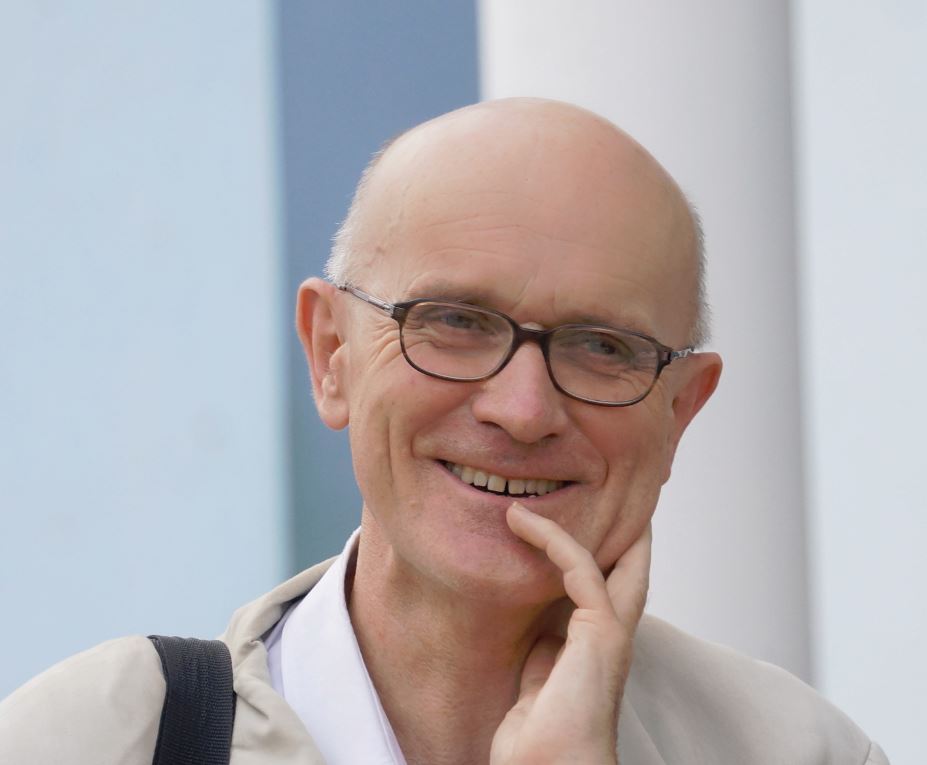Stephen Ellis Annual Lecture by Emmanuel Akyeampong: Spirituality, Culture & Political Power in Early Independent West Africa

In the middle: Kwame Nkrumah (Ghana) and Sekou Touré (Guinea).
This event took place on 3 December 2019. Watch a video or take a look at the photo album (Facebook).
In his work Stephen Ellis probed the continuing influence of indigenous religions and cultural idioms and understandings of power on contemporary politics in West Africa. In Masks of Anarchy: The Destruction of Liberia and the Religious Dimensions of an African Civil War (1999, 2006), his examination of the place of spirituality, the occult and ritual in the careers of rebel leaders, including acts of cannibalism, drew the ire of Charles Taylor. In his study of the Okija Shrine (Journal of African History, 2008), Ellis provided a penetrating analysis of the fiduciary role of the shrine in political arrangements between political aspirants and their godfathers in Nigerian politics. Ellis was intrigued by the dual registers (“traditional” and “modern,” “spiritual” and “secular”) of power evident in the lives of politicians enmeshed in modern politics. These insights receive sustained treatment in Stephen Ellis and Gerrie Ter Haar, Worlds of Power: Religious Thought and Political Practice (2001, 2004).
In this memorial lecture named after Stephen Ellis, Prof. Emmanuel Akyeampong draws on his insights to explore the nexus of spirituality, culture, and political power in the connected lives of three first-generation African nationalist leaders: Kwame Nkrumah of Ghana, Sekou Touré of Guinea, and Leopold Senghor of Senegal. Mission-educated (Catholic) in the cases of Nkrumah and Senghor, with the former even considering a priestly vocation and the latter deeply influenced by his Catholic faith, the exigencies of political power and nation-building necessitated reaching out to different religious constituencies. Imagining the African nation-state opened doors to various ethnic cultural influences. These processes were not unambiguous, unsurprisingly, and this first generation of nationalist political leaders – in their experiments with secular, modern African nation-states – would bequeath multiple registers that continue to shape modern politics in contemporary Africa.

The Stephen Ellis Annual Lecture is organized in honour of our late ASCL colleague who died in 2015. Gerrie ter Haar, Stephen Ellis’ widow, will be our guest of honour.
Afterwards, as of 20:00, there will be drinks provided (exact location t.b.c.)
Read more about Stephen Ellis and the past Stephen Ellis annual lectures.
Speaker
 Emmanuel Akyeampong is the Ellen Gurney Professor of History and of African and African American Studies and Oppenheimer Faculty Director of the Center for African Studies at Harvard University. He served as chair of the Committee on African Studies at Harvard from July 2002 to June 2006 and was appointed a Loeb Harvard College Professor from July 2005 through June 2010. He is a Fellow of the Ghana Academy of Arts and Sciences, and a Corresponding Fellow of the Royal Historical Society (UK).
Emmanuel Akyeampong is the Ellen Gurney Professor of History and of African and African American Studies and Oppenheimer Faculty Director of the Center for African Studies at Harvard University. He served as chair of the Committee on African Studies at Harvard from July 2002 to June 2006 and was appointed a Loeb Harvard College Professor from July 2005 through June 2010. He is a Fellow of the Ghana Academy of Arts and Sciences, and a Corresponding Fellow of the Royal Historical Society (UK).
Prof. Akyeampong is a member of the Scientific Committee of the Council for the Development of Social Science Research in Africa (CODESRIA) and sits on the Advisory Council of the Carnegie African Diaspora Fellows Program. He also serves as the president of the African Public Broadcasting Foundation (US), a partnership of academic researchers, African broadcasters and African producers dedicated to the production of development-oriented programs for broadcast on television, radio and the Internet.
His research interests are social history, comparative slavery and the African diaspora, environmental history, the history of disease and medicine, economic and business history.
He is the author and editor of several books and articles including Drink, Power, and Cultural Change: A Social History of Alcohol in Ghana, c.1800 to Recent Times (1996); and Between the Sea and the Lagoon: An Eco-Social History of the Anglo of Southeastern Ghana (2001), and editor of Themes in West Africa’s History (2006). He served as co-chief editor with Henry Louis Gates, Jr., for the Dictionary of African Biography, 6 vols. (2012) and with Alan G. Hill and Arthur Kleinman he edited The Culture of Mental Illness and Psychiatric Practice in Africa (2015). Akyeampong has been a co-editor of the Journal of African History, of African Diaspora, served on the editorial boards of several other academic journals, and is an editor of the African Arguments series (Zed Books).

